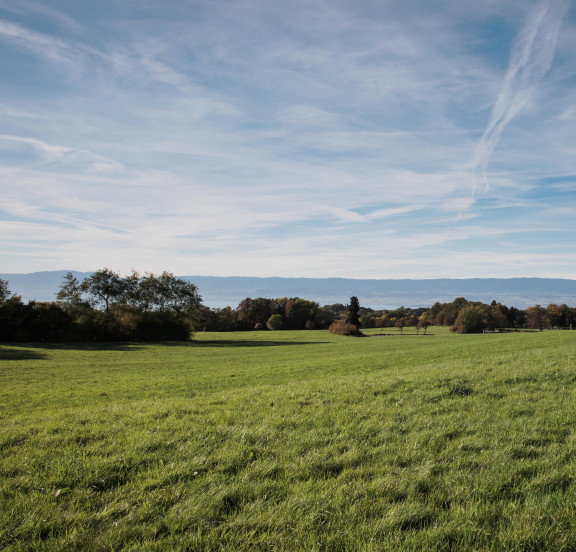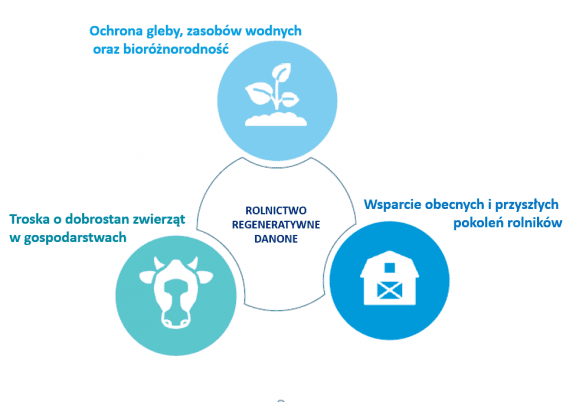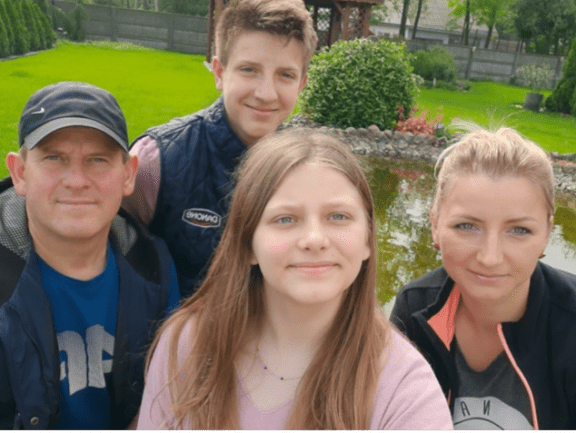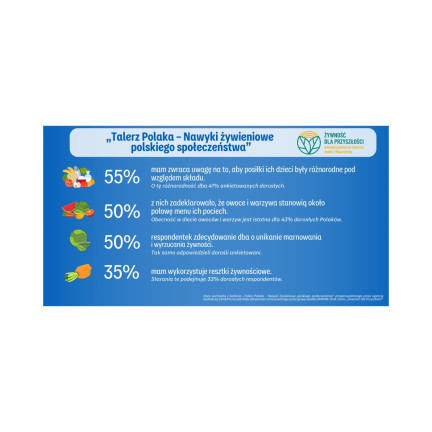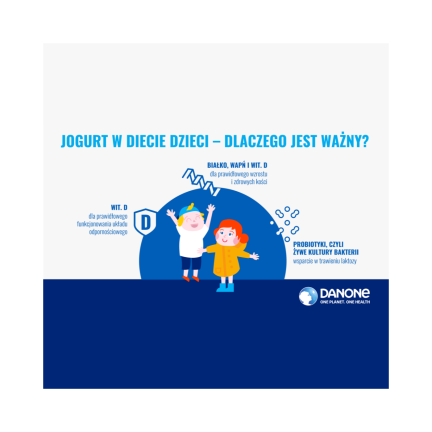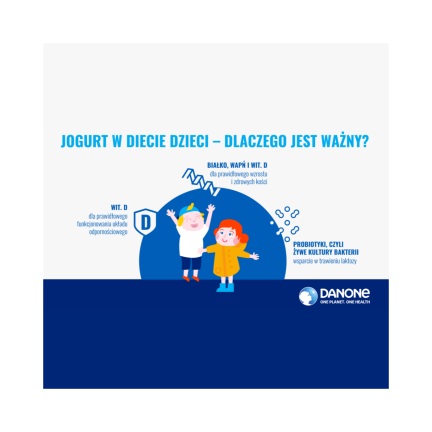Regenerative Agriculture
We know that food production must go hand in hand with caring for the soil condition and its skillful management. That is why at DANONE we have been working to develop and promote good regenerative agriculture practices.
High-quality food that ends up on our table starts its journey in the soil. Healthy soil provides the necessary nutrients and water for plants which in turn provide the necessary nutrients for fungi and bacteria living in the soil.
At Danone, agriculture is at the heart of what we do. Only with high-quality ingredients can we manufacture our products and fulfill our mission of bringing health through food to as many people as possible.
By understanding that today agriculture is at the heart of many serious challenges, from economic development and climate changes to water scarcity and the loss of biological diversity, at Danone we are determined to help overcome these problems. We are proud that only in Poland do we maintain close relationships with farmers and have been collaborating with most of them for over 20 years. Together we develop new agricultural models that may regenerate the planet, while simultaneously providing food to the global population, which is expected to exceed 9 billion by 2050.
Our understanding of regenerative agriculture
Intensive soil tillage with the wrong tools, combined with climate changes, contributes substantially to the degradation of biological diversity and soil fertility.
We are convinced that together with our farmers we must care for the soil condition and manage it skillfully. Good practices allow to improve soil condition, mainly through increasing the organic matter contents and the diversity of fauna and flora, both above and below the ground. This also leads to increased water retention and carbon sequestration in the soil, which in turn reduces its emission to the atmosphere and has a positive effect on soil structure. Regenerative agriculture may mitigate climate change and indirectly improve people’s health. Developing good regenerative agriculture practices is not only beneficial to the climate and communities, but also farm owners and companies such as Danone. Regenerative agriculture makes farms and the manufacturers they collaborate with more resilient to changes and increases their effectiveness through a number of solutions, including cost reductions. It also responds to the needs of the consumers who expect more sustainable farming and manufacturing.
*Schreefel i in. 2020

1. Soil and water resource protection and biodiversity
Thin surface soil layer is responsible for producing 95% of all the food for people. The soil, however, is a resource that we wrongly took for granted – it is estimated that 33% of world’s land* is degraded to a level between moderate and strong. By changing agricultural practices, we can start turning this around and build healthy and resilient soil.
Healthy soil absorbs carbon dioxide, which contains huge amounts of carbon collected from the atmosphere by plants in the photosynthesis process. For this reason, we promote agricultural practices that increase soil organic matter contents and facilitate sequestration of larger amounts of carbon, such as chemical protection, crop rotation, soil tillage limitation and using harvest residues as compost.
Research has also shown that healthier soils are more resilient both to drought and erosion caused by heavy rains or wind. Healthy soil is capable of retaining more water, enhancing its ability to support microorganisms and plant growth.
Accounting for a quarter of the global biodiversity, microorganisms living in healthy soil nourish and protect the biological diversity of plants and animals, thus creating healthy ecosystems that are more resilient to stress related to climate change.
At Danone, we cooperate with our farmers in order to introduce practices that support caring for soil condition, as well as its skillful management. In 2021, we are introducing a new special regenerative agriculture audit for all milk producers.
*source: Main FAO report – Status of the World's Soil Resources, 2015
2. Supporting the current and future generations of farmers
Farmers are most familiar with their land and are the key driving force behind the shift towards regenerative agriculture. Our goal is to support farmers in the introduction of these changes in the most effective way possible and to accompany them during the passing of their line of work to the next generation.
One way to achieve this is the development of lasting partnerships with farmers that often span many generations. These close relationships allow us to conclude long-term contracts and implement a new pricing management system that is grounded on evolving production costs and not on the market. In Poland, for several years we have been successively implementing a settlement model that is based on the costs incurred by suppliers during the production process on a particular farm. In the long-term perspective, such a stable price secures added value for both parties. Our cooperation with suppliers is a partnership-based relationship and we support them in achieving financial stability. In Poland, we support farmers mainly through direct cooperation with the farm keepers; we partner with our farms on a number of initiatives to support their growth and stabilization process. We set the standards for the development of milk production by combining economical, social and quality goals with environmental requirements and caring about responsible and ethical farming. Our standards are meant to help milk producers adjust to the changing environment and to ensure a long-term growth of their farms.
3. Being mindful of animal welfare
Animals are an integral part of regenerative agriculture. We believe that a high level of animal welfare is the key to the regeneration of farms, as well as to reinforcement of their economic sustainability, efficiency and competitiveness. Dairy farms with higher standards of animal welfare secure better yields and quality of milk, while simultaneously improving the health and longevity of animals, thus improving competitiveness.
Our approach to animal welfare – developed in cooperation with Compassion in World Farming (CIWF) and other animal welfare specialists – is based on the internationally recognized Five Freedoms, as defined by the Farm Animal Welfare Council (FAWC). We are working on ensuring compliance with these freedoms for all species within our supply chain.
For many years, Danone, as one from among a few companies, has been performing regular Animal Welfare audits with its suppliers in Poland. These allow to determine the current welfare level on a farm. The results obtained precisely pinpoint significant deviations from desirable standards, which are also improvement areas. They also show the outcomes of actions taken since the previous evaluation. As it requires engagement and active participation of both parties, the audit provides a great opportunity to build awareness and set goals.
At the turn of 2019 and 2020, Ryszard decided to introduce a radical change in his agrarian practices by implementing an innovative plant cultivation technology called strip-till. It allows to significantly limit the number of cultivation-related activities, while simultaneously increasing the scope of cultivation and sowing efficiency. Measurable advantages include time savings, reduced fuel consumption, increased availability of nutrients, protection of soil against excessive water loss and wind erosion.
„Farm to fork strategy”
The emergency has made us appreciate how reliant we are on our farmers and the workers that pick, transform, transport and make available our food, from farm to fork. The complexity of global supply chains has turned out to be a significant weakness, while strong locally-rooted food ecosystems are proving their strength.
We must take advantage of renewed societal awareness of our vulnerability to build together a more resilient, sovereign food system for Europe.
The EU is well placed to lead by example. Its geography, climate and cultural diversity are unique assets. The EU already benefits from a number of very relevant and forward-looking common policies on agriculture, food safety and quality, food information, climate change and circular economy - but these do not yet add up to an inclusive overarching strategy for food. The upcoming ‘Farm to Fork’ and Biodiversity 2030 Strategies are unique opportunities to end this piecemeal approach and finally put in place a comprehensive, consistent EU Common Food Policy, which needs to be embedded in the frame of planetary health diets and ensure European food sovereignty. Such a policy would encompass the economic, environmental, social and public health nutrition dimensions of the entire food system and reap all the benefits across these dimensions.
DANONE SOIL TALK #1 – HOW TO PUT CARBON IN THE SOIL, NOT IN THE AIR


